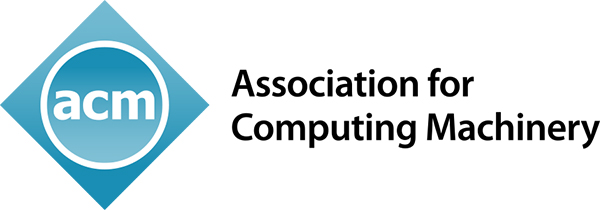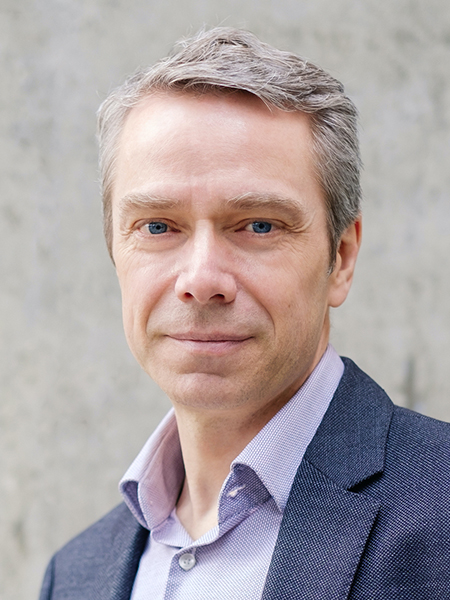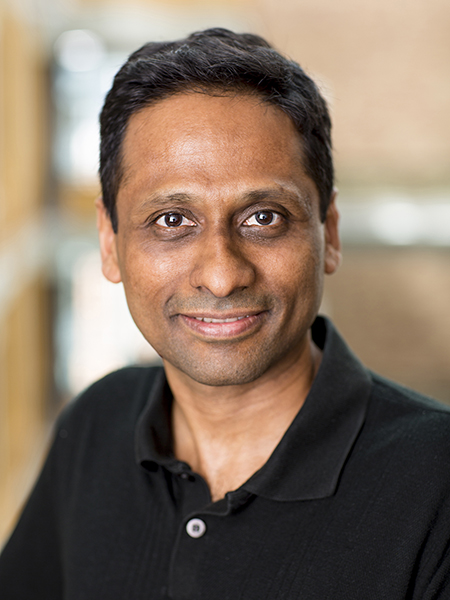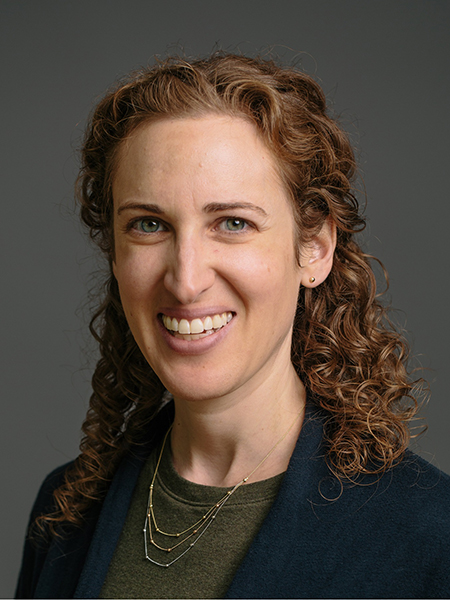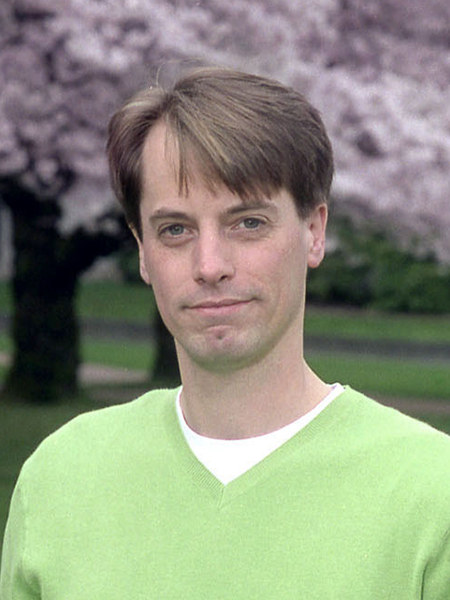Allen School professors Dieter Fox and Arvind Krishnamurthy recently attained the status of Fellows of the Association for Computing Machinery in honor of their influential contributions to robotics and computer vision and to systems and networking, respectively. Each year, the ACM bestows the designation of Fellow on a select group of members to recognize their impact through research and service based on nominations submitted by their peers in the computing community.
According to ACM President Gabriele Kotsis, in 2020 the organization received a record number of nominations from around the world aiming to highlight individuals who have made “pivotal contributions to technologies that are transforming whole industries, as well as our personal lives.” The ACM’s recognition of Krishnamurthy and Fox brings the number of Allen School faculty members elevated to Fellow to 26. Allen School affiliate professor Meredith Ringel Morris, an expert in human-computer interaction and accessibility at Microsoft Research, and former Allen School professor Steve Gribble, now a distinguished engineer focused on networked systems at Google, joined Fox and Krishnamurthy among the 95 researchers worldwide to be recognized for their achievements in the new class of Fellows.
Dieter Fox
Dieter Fox was elevated to the status of ACM Fellow for “contributions to probabilistic state estimation, RGB-D perception, and learning for robotics and computer vision.” Fox’s work, which spans roughly 25 years, has had an influential impact across multiple areas, opened up new avenues of research, and helped establish the University of Washington as a leader in robotics and artificial intelligence research.
Fox currently serves as director of the Allen School’s Robotics and State Estimation Laboratory and senior director of robotics research at NVIDIA. He joined the UW faculty in 2000 after earning his Ph.D. from the University of Bonn in Germany and completing a postdoc at Carnegie Mellon University. Fox was among the pioneers of probabilistic robotics, for which he co-authored a textbook of the same name, which aims to address problems in perception and control to endow robots with the ability to interact with people and their environment in an intelligent way.
Among Fox’s contributions is a series of novel techniques for Bayesian state estimation that have resulted in significant advancements across a variety of domains, including object manipulation, human activity recognition, and localization and mapping. For the latter — one of the fundamental problems in robotics — Fox’s early work on Markov localization in dynamic environments is considered to be a significant milestone. He and his colleagues built on that work with the introduction of Monte-Carlo Localization, a technique that broke new ground with its use of sampling-based methods that proved to be more accurate, more computationally efficient, and easier to implement than previous approaches. MCL subsequently became the preferred approach in the field, and today localization is widely regarded as a solved problem in robotics.
In another series of firsts, Fox contributed to new systems for achieving robust 3D-mapping capabilities using RGB-D cameras and advancing robot learning by incorporating model-based information into deep learning approaches. In a paper that combined insights from robotics and computer vision, Fox and colleagues in the Allen School’s Graphics & Imaging Laboratory (GRAIL) presented DynamicFusion, the first dense simultaneous localization and mapping (SLAM) system capable of producing detailed and complete reconstructions of subjects in motion, and in real time. Fox and collaborators subsequently leveraged that capability to automate the generation of robust visual training data from RGB-D video in order to take advantage of new deep learning techniques. The resulting framework enabled robots to learn rich visual features of objects and people in their environment in a self-supervised way. Self-supervised learning has since emerged as a highly active area of robotics research.
Over the course of his career, Fox has earned multiple Best Paper and Test of Time Awards at the preeminent research conferences in artificial intelligence, robotics, computer vision, and ubiquitous computing. Prior to his election as a Fellow of the ACM, Fox attained the status of Fellow of both the Association for the Advancement of Artificial Intelligence (AAAI) and the Institute for Electrical and Electronics Engineers (IEEE). Last year, Fox earned the IEEE Robotics & Automation Society’s RAS Pioneer Award in acknowledgment of his groundbreaking contributions to state estimation, robot perception and machine learning as well as his efforts to bridge academic and industrial research through his many collaborations with Intel, NVIDIA, and other partners.
Arvind Krishnamurthy
Arvind Krishnamurthy was named a Fellow of the ACM for “contributions to networks and distributed computer systems.” Krishnamurthy’s research advances state-of-the-art approaches for building robust and efficient computer systems to support data center operations and internet-scale computing. His work encompasses topics such as internet measurement and reliability, peer-to-peer data sharing, data center performance, network routing, and systems for bridging the gap between machine learning and hardware innovation.
After earning his Ph.D. at the University of California, Berkeley in 1999, Krishnamurthy began his career as a faculty member at Yale University. Since joining the Allen School faculty in 2005, Krishnamurthy has focused on advancing new network primitives, protocols and services to make the internet more reliable and resilient and to optimize distributed and networked systems inside data centers. Krishnamurthy ‘s work has earned multiple awards at the preeminent conferences in operating and networked systems, including five Best Paper or Best Student Paper designations at the Symposium on Networked Systems Design and Implementation (NSDI).
One of Krishnamurthy’s contributions to be singled out by NSDI was Reverse Traceroute, the first tool for diagnosing internet performance issues that expanded upon existing capabilities for tracing packets from source to destination to include their asymmetric return paths. The tool gained popularity for troubleshooting performance problems within corporate internal networks as well as on the internet. Three years later, Krishnamurthy and his collaborators presented their award-winning paper describing F10, a fault-tolerant network designed explicitly for the data-center setting to improve the reliability and performance of applications in the cloud. Consisting of a novel network topology and failover protocols designed to cascade and complement each other, F10 proved capable of reestablishing connectivity and load balance almost instantaneously, even in the presence of multiple failures.
Krishnamurthy was also a member of the team behind a novel operating system designed to address recent application and hardware trends that are hampered by the traditional operating-system model. In proposing Arrakis, which earned the Best Paper Award at the 2014 conference on Operating Systems Design and Implementation (OSDI), Krishnamurthy and his collaborators re-engineered the OS kernel to provide network and disk protection without requiring mediation of every operation. As a result, most applications are able to bypass the kernel entirely in favor of direct access to virtualized input/output (I/O) devices. By reimagining the traditional role of the OS kernel, the researchers demonstrated that high performance and protection could go hand in hand.
More recently, Krishnamurthy co-led a team of researchers that created TVM, a framework that enabled researchers and practitioners to take advantage of emerging machine learning capabilities — and their attendant productivity gains — by making it easy to deploy the latest deep learning applications on a range of devices without sacrificing battery power or speed. Krishnamurthy and colleagues subsequently earned a Best Paper from IEEE Micro for introducing an extension to TVM, the Versatile Tensor Accelerator (VTA), that offered a customizable deep learning architecture designed to be extensible in the face of evolving workloads while preserving the efficiency gains achieved by hardware specialization. Together, TVM and VTA provided the blueprint for an end-to-end deep learning system for supporting experimentation, optimization, and hardware-software co-design. The team later transitioned TVM to Apache and launched a related startup company, OctoML, for which Krishnamurthy serves as an advisor.
Meredith Ringel Morris
Allen School affiliate professor Meredith “Merrie” Ringel Morris is a senior principal researcher and the research area manager for Interaction, Accessibility and Mixed Reality at Microsoft Research, where she founded the Ability Research Group. An internationally renowned researcher with expertise spanning collaborative technologies, gesture interfaces, social media, crowdsourcing, accessible technologies, universal design, human-centered AI, and more, Morris was named a Fellow of the ACM for “contributions to human-computer interaction, information retrieval, computer-supported cooperative work and accessibility.”
Morris first joined Microsoft Research in 2006 after earning her Ph.D. from Stanford University. She holds more than 20 U.S. patents, and her work has influenced many of Microsoft’s products and services in her 15 years with the company. Morris has authored or co-authored more than 100 research publications, including multiple papers that have been recognized with Best Paper Awards or Lasting Impact Awards at major conferences in the field. Last year, Morris was elected to the CHI Academy by the ACM Special Interest Group on Computer-Human Interaction (SIGCHI) in recognition of her many and varied contributions to HCI research, including establishing the field of collaborative web search, initiating the study of friendsourced information seeking, advancing surface computing and gesture design, and furthering research into accessible social media and communications technologies. Previously, she was recognized as one of Technology Review’s “Innovators under 35” for her work on SearchTogether, a browser plugin that enables collaborative web search.
Steve Gribble
Former professor Steve Gribble, who spent 13 years on the Allen School faculty before leaving for industry, was named a Fellow of the ACM for “contributions to virtualization technology across clusters, servers, and networks.” Now a distinguished engineer at Google, Gribble’s current work involves designing, building, and deploying host-side networking systems, I/O offload hardware infrastructure for Google’s cloud, and software-defined networking (SDN) systems that make the company’s planetary-scale networks available, debuggable, and safe to operate.
Gribble joined the UW faculty in 2000 after earning his Ph.D. from the University of California, Berkeley. Together with Allen School colleagues, in 2006 he co-founded Skytap, a venture-backed startup company that provides cloud-based software development, test and deployment platforms. Gribble has authored or co-authored more than 70 research publications, including seven that earned Best Paper or Best Student Paper Awards at major systems conferences. During his time at the Allen School, Gribble received an Alfred P. Sloan Research Fellowship and a National Science Foundation CAREER Award for his work on the design and operation of robust, scalable internet infrastructure and services, mobile computing, virtual machine monitors, operating systems, and networks.
The new Fellows will be formally inducted at the ACM awards banquet in June. Learn more about the 2020 class of ACM Fellows here.
Congratulations to Dieter, Arvind, Merrie and Steve!


